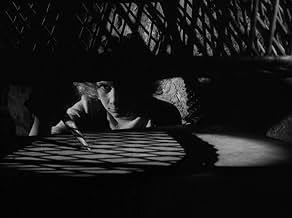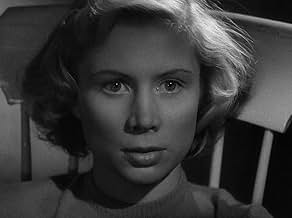IMDb RATING
6.7/10
2.3K
YOUR RATING
A film director tries to create the best film in history, but finds out that human abilities have their limits.A film director tries to create the best film in history, but finds out that human abilities have their limits.A film director tries to create the best film in history, but finds out that human abilities have their limits.
Birgit Lindkvist
- Anna - inneboende på pensionatet
- (as Bibi Lindkvist)
John W. Björling
- En man i Birgitta Carolinas dröm
- (uncredited)
Sven Björling
- En filmarbetare i ateljén
- (uncredited)
Anita Blom
- Anna - Signes kusindotter
- (uncredited)
Britta Brunius
- Lasses mamma
- (uncredited)
Åke Engfeldt
- Ena kriminalpolisen
- (uncredited)
Gösta Ericsson
- Andra kriminalpolisen
- (uncredited)
Kenne Fant
- Arne - Skådespelare
- (uncredited)
- Director
- Writer
- All cast & crew
- Production, box office & more at IMDbPro
6.72.3K
1
2
3
4
5
6
7
8
9
10
Featured reviews
PRISON (Ingmar Bergman, 1949) ***
This is the earliest Bergman film that I've watched, and already the prime concerns that occupied him throughout most of his career - human relationships, sex, faith, death, etc. - are well in evidence.
Interestingly, the narrative is set against a motion-picture backdrop; in fact, the film demonstrates a self-conscious approach to the medium that would re-emerge in later efforts such as PERSONA (1966) and THE PASSION OF ANNA (1969): rather than observing the normal procedure for the time, the credits don't appear at the outset but, effectively interrupting the proceedings after the first reel, these are given in a voice-over! Besides, the plot seems to be following the interconnecting vicissitudes of a variety of characters - but chiefly the crisis facing two separate couples - all of which, somewhat murkily and pretentiously, serves as a morality play about the triumph of Evil over Good, as envisioned in a framework set inside a studio and involving a film director's old ex-professor (the former happens to be the elder brother of one of the characters in the main narrative!).
It's all rather fascinating for much of the running-time - and the director's visual style really can't be faulted (a dream sequence is especially effective and there's even a short and quite amusing Silent slapstick film-within-a-film, ostensibly the amateurish work of one of the characters!) - but, eventually, the over-ambitious structure of PRISON (by the way, neither this vague title nor the equally well-known alternate given the film on its American release, THE DEVIL'S WANTON, really serve the purpose of its existentialist theme and generally introspective tone), to say nothing of the relentless gloominess, wear the whole down somewhat. All in all, however, it's a fine piece of work from a film-maker who would go on to become one of the leading forces in cinema during the second half of the 20th century.
Interestingly, the narrative is set against a motion-picture backdrop; in fact, the film demonstrates a self-conscious approach to the medium that would re-emerge in later efforts such as PERSONA (1966) and THE PASSION OF ANNA (1969): rather than observing the normal procedure for the time, the credits don't appear at the outset but, effectively interrupting the proceedings after the first reel, these are given in a voice-over! Besides, the plot seems to be following the interconnecting vicissitudes of a variety of characters - but chiefly the crisis facing two separate couples - all of which, somewhat murkily and pretentiously, serves as a morality play about the triumph of Evil over Good, as envisioned in a framework set inside a studio and involving a film director's old ex-professor (the former happens to be the elder brother of one of the characters in the main narrative!).
It's all rather fascinating for much of the running-time - and the director's visual style really can't be faulted (a dream sequence is especially effective and there's even a short and quite amusing Silent slapstick film-within-a-film, ostensibly the amateurish work of one of the characters!) - but, eventually, the over-ambitious structure of PRISON (by the way, neither this vague title nor the equally well-known alternate given the film on its American release, THE DEVIL'S WANTON, really serve the purpose of its existentialist theme and generally introspective tone), to say nothing of the relentless gloominess, wear the whole down somewhat. All in all, however, it's a fine piece of work from a film-maker who would go on to become one of the leading forces in cinema during the second half of the 20th century.
2.2.2024
Bergman Collection 20 All Reached
Bergman's first scripted film at the helm, and I didn't expect it to be that good in comparison to his entire career. It's a shame that the CC compilation didn't choose to include this Bergman film, with a hint of that New Wave flavor from Monica the Delinquent. Opened the movie on b-site with the anticipation of the Mask references.
The camera reveal in Godard's Contempt has long been a novelty, and it seems Bergman is still a master of his craft.
Outstanding light shaping, which has become rare in the late Bergman, it is difficult to change the lighting team?
And actually started so early in the discussion of ghosts and gods worthy of Bergman, this step should be counted into the faith trilogy.
BIBI's awful big eyes almost ruined the movie, but I still appreciate her excellent interpretation of the surreal moments that Bergman gave her life. Those big eyes seem to sparkle as if they simply don't know where to use themselves.
The ending wraps up the theme of ghosts and gods, while the core is a human framework, perfect drama. Seal the deal.
Bergman's first scripted film at the helm, and I didn't expect it to be that good in comparison to his entire career. It's a shame that the CC compilation didn't choose to include this Bergman film, with a hint of that New Wave flavor from Monica the Delinquent. Opened the movie on b-site with the anticipation of the Mask references.
The camera reveal in Godard's Contempt has long been a novelty, and it seems Bergman is still a master of his craft.
Outstanding light shaping, which has become rare in the late Bergman, it is difficult to change the lighting team?
And actually started so early in the discussion of ghosts and gods worthy of Bergman, this step should be counted into the faith trilogy.
BIBI's awful big eyes almost ruined the movie, but I still appreciate her excellent interpretation of the surreal moments that Bergman gave her life. Those big eyes seem to sparkle as if they simply don't know where to use themselves.
The ending wraps up the theme of ghosts and gods, while the core is a human framework, perfect drama. Seal the deal.
Jumbled Bergmann Film with Good Cinematography - Prison
The real prison is in the minds of these people, and in Bergman's in particular. Bergmann was always obsessed with depression and death; it was in all his fllms. Just like violence is in every Sergio Leone film, some directors are obsessed with one emotion or another. In this one, we find supposedly talented artists are having a difficult time with life. O poor little me! Get over it. People with real talent don't get despondent, they get to work. They may get down once in a while, but they bounce back from adversity, and overcome it. These wusses do not. They expect miracles from their mediocre talents and efforts, and are disappointed when they are not recognized as geniuses or great artists. You know how many years Bogart or Streep had to struggle before they became major stars? A lot longer than these no-talents. I hate agreeing with Woody Allen, but Bergmaaaaan is a joke; a bad joke at that. At least the photography is interesting.
Not one of the most interesting Bergman films
Minor, depressing early Ingmar Bergman drama, bulit on an ambitious life-mirrors-art concept that doesn't really come off. It begins with the premise of a director being pitched the idea of making a film that depicts "Hell on Earth", but then the movie seems to try to prove this thesis via the story of some people involved in the filmmaking process. There is one notable extended dream sequence, but the most original touch is probably the spoken opening credits that never actually appear on the screen. It's a well-made and well-acted film, but one recommended mostly for dedicated Bergman followers. ** out of 4.
Bergman experimenting with a style of his own
"Prison" (1949) is the first film in which Ingmar Bergman develops something like a style of his own.
We see various elements that reappear in later movies. There is the character of death (to reappear in "The seventh seal", 1957) and dreamsequences (to reappear in "Wild strawberries", 1957).
The most important sign for things to come is however the theme of the film. The film is about a director trying to make a film about a world governed by the devil. Is a world governed by the devil not very much like a wordl where God is silent? Later Bergman would make a trilogy around this theme consisting of the films "Through a glass darkly" (1961), "Winterlight" (1963) and "The silence" (1963).
So in "Prison" Bergman started to experiment with a personal style, but this style was not fully developed yet. There are good sequences (such as the dream sequence) but as a whole the film is somewhat cluttered and inaccessible. Moreover the film in a film format about a director struggling to make a film does not work very well in "Prison". It does work very well in "8,5" (1963, Federico Fellini), but the Bergman of 1949 is not the Fellini of 1963.
We see various elements that reappear in later movies. There is the character of death (to reappear in "The seventh seal", 1957) and dreamsequences (to reappear in "Wild strawberries", 1957).
The most important sign for things to come is however the theme of the film. The film is about a director trying to make a film about a world governed by the devil. Is a world governed by the devil not very much like a wordl where God is silent? Later Bergman would make a trilogy around this theme consisting of the films "Through a glass darkly" (1961), "Winterlight" (1963) and "The silence" (1963).
So in "Prison" Bergman started to experiment with a personal style, but this style was not fully developed yet. There are good sequences (such as the dream sequence) but as a whole the film is somewhat cluttered and inaccessible. Moreover the film in a film format about a director struggling to make a film does not work very well in "Prison". It does work very well in "8,5" (1963, Federico Fellini), but the Bergman of 1949 is not the Fellini of 1963.
Did you know
- TriviaIngmar Bergman's first film based on his own original screenplay.
- Crazy creditsThere are no opening titles in this film. An unseen narrator (Hasse Ekman) reads the credits, as well as the title, out loud approximately ten minutes in to the movie. The sole title card is the standard "Slut" (Swedish for "End") that closes the picture.
- ConnectionsEdited into Histoire(s) du cinéma: Une histoire seule (1989)
- SoundtracksDrömmen
Composed by Erland von Koch (1949)
- How long is Prison?Powered by Alexa
Details
Box office
- Budget
- SEK 240,000 (estimated)
- Runtime
- 1h 19m(79 min)
- Color
- Sound mix
- Aspect ratio
- 1.33 : 1
Contribute to this page
Suggest an edit or add missing content



































